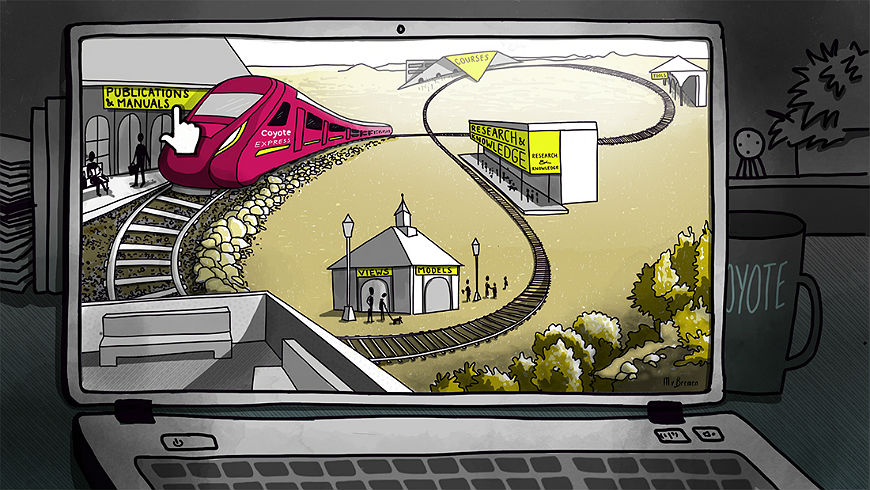Training resources – where to find more!
by the Coyote editorial team
25/11/2019
If you’ve had your interest sparked by any of the articles here, there is a load of material available for you to find out more, particularly online! Manuals, research, and more recently “how to” videos for training in non-formal education. We have put together some examples here – please let us know if we have missed anything important so we can add to this.
Looking for …
… publications and manuals
COMPASS
Compass is a reference manual for many people involved in value-based youth work and non-formal education. It is currently available in more than 30 languages, ranging from Arabic and Japanese to Icelandic and Basque. In some countries it has become part of the resources for rights education in schools and in some others it is not possible to use in schools. The adventures of Compass across Europe often mirror the contrasting reality of human rights education: promoted here and combated there, praised by some and despised by others.
TRAINING KITS
https://pjp-eu.coe.int/en/web/youth-partnership/t-kits
The training kits of the EU-Council of Europe Youth Partnership open up diverse topics and offer training tools and methodologies to work on them with young people. “Training essentials” T-kit (now being revised) and “Educational evaluation” are among those providing basic theory and explaining non-formal education practice and approach.
COMPASITO
www.eycb.coe.int/compasito/default.htm
Compasito is a manual on human rights education with participants of a young age, applicable for work in diverse youth work contexts and even formal settings.
EDUCATION PACK
The Education Pack of the All Different – All Equal campaign is one of the widely used publications of the Youth Department of the Council of Europe on intercultural education, which is very applicable to working with diverse groups of young people on building intercultural competence.
MANUAL FOR FACILITATORS IN NON-FORMAL EDUCATION
Manual for facilitators in non-formal education involved in preparing and delivering the programme of study sessions at European Youth Centres
MIRRORS MANUAL
https://rm.coe.int/CoERMPublicCommonSearchServices/DisplayDCTMContent?documentId=0900001680494094
Manual on combating antigypsyism through human rights education
EU-COUNCIL OF EUROPE HANDBOOK ON QUALITY IN LEARNING MOBILITY
https://pjp-eu.coe.int/documents/0/47261953/Handbook+LM/3a5c103c-0367-4eba-1aca-ee544826f557
This handbook is intended to support organisers of learning mobility projects in the youth field.
… online and offline courses and capacity building
YOUTRAIN – THE GUILD OF YOUTH TRAINERS
www.youtube.com/channel/UCrP1Y7Bl4_8rW4wIitZ6M3g
(https://iywt.org/youtrain/)
The International Youth Work Trainers Guild together with partners Coobra, Ha Moment and Euromove developed a series of video tutorials for non-formal educators and trainers on important aspects and considerations in non-formal education, a set of video tutorials on specific methods in non-formal education, and a manual on how to produce video-tutorials by yourself.
… views and models
EUROPEAN TRAINING STRATEGY
www.salto-youth.net/rc/training-and-cooperation/trainercompetencedevelopment/trainercompetences/
The ETS competence model was developed for trainers to assess and plan development in seven main competence areas in order to ensure the quality of training in Europe.
TOOLS FOR LEARNING ARTICLES
http://educationaltoolsportal.eu/tools-for-learning/articles
Collection of various articles and views on different topics related to non-formal education and youth training. In particular, check out the two-part look at trainers’ culture!
… research and knowledge
YOUTH KNOWLEDGE BOOKS
More reflections and articles on non-formal education and intercultural learning can be found in the following Youth Knowledge book:
Learning mobility, social inclusion and non-formal education. Access, processes and outcomes
https://pjp-eu.coe.int/en/web/youth-partnership/learning-mobility-2
INTERCULTURAL LEARNING IN NON-FORMAL EDUCATION
https://pjp-eu.coe.int/en/web/youth-partnership/intercultural-learning-in-non-formal-education
COYOTE – ISSUE 0
A flashback to reflections on non-formal education 20 years ago:
https://pjp-eu.coe.int/en/web/youth-partnership/issue-0-july-1999
EUROPEAN YOUTH FORUM POLICIES ON EDUCATION
COUNCIL OF EUROPE POLICY RECOMMENDATION ON NON-FORMAL EDUCATION
The Council of Europe’s Committee of Ministers has a policy recommendation on non-formal education.
Recommendation Rec(2003)8 on the promotion and recognition of non-formal education/learning of young people is a useful policy tool in the area of recognition of non-formal education and can be used in policy making.
SOCIAL RIGHTS AND ENTER! RECOMMENDATIONS MEASURES
www.coe.int/en/web/enter/supporting-non-formal-education-and-youth-work
Supporting non-formal education and youth work
UNESCO’S WORK ON NON-FORMAL EDUCATION
https://unesdoc.unesco.org/search/ee83cba3-619e-4f56-9d3e-35fe86ad497f
More globally you might want to check out the work of UNESCO on promoting non-formal education. The online library of UNESCO provides a good overview of reports and tools for using non-formal education beyond the youth sector.
... profiles of experts
COUNCIL OF EUROPE POOL OF TRAINERS
https://trainers-youthapplications.coe.int/Members-of-Trainers-Pool
SALTO TOY (TRAINERS ONLINE FOR YOUTH) REGISTER
www.salto-youth.net/tools/toy/
THE EUROPEAN YOUTH FORUM POOL OF TRAINERS
It has a pool of trainers and experts and works on the promotion of training and non-formal education. You can find more information here:
www.youthforum.org/pool-trainers-and-experts-make-your-organisation-grow and the policy papers can be found here.
... tools
SALTO RESOURCE
www.salto-youth.net/tools/toolbox/
Salto Toolbox for training is a co-managed and co-shared database of non-formal education tools allowing trainers not only to upload the tools, but also to receive up-to-date feedback.
MULTILINGUAL TOOLBOX
http://educationaltoolsportal.eu/en/tools_front
As the name suggests, this experiment by SALTO EuroMed brings tools together and encourages the learning community to translate and adapt them. See what you think!
DIGI YOUTH PORTAL – SOUTH EAST EUROPEAN YOUTH NETWORK
Online learning and digital tools in youth work by South East European Youth Network. This handbook is an interactive digital tool which aims to support youth workers and youth trainers/educators to develop and implement various learning content based on non-formal education methodology. It also supports youth workers with different tools and methods of employing different digital media tools in their work.
OPEN BADGES
https://badge.wiki/wiki/Main_Page
Open Badges are visual digital tokens of achievement, affiliation, authorisation or other trust relationships sharable across the web. Open Badges represent a more detailed picture than a CV or résumé as they can be presented in ever-changing combinations, creating a constantly evolving picture of a person’s lifelong learning.
Something to keep an eye on! From March 2020 it is planned to open a very important resource for trainers:
TRAINERS LIBRARY – INFORMATION
The idea of the Trainers Library is to be a training resources library (crowdsourced) that will be a complementary tool in addition to the trainers’ competence model as part of the European Training Strategy within the Erasmus+ programme.

